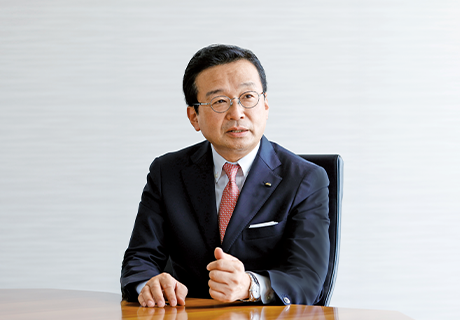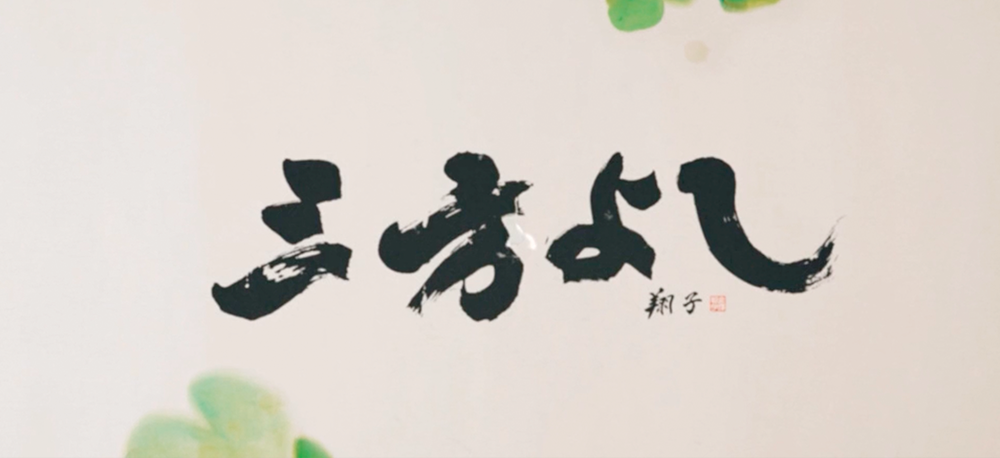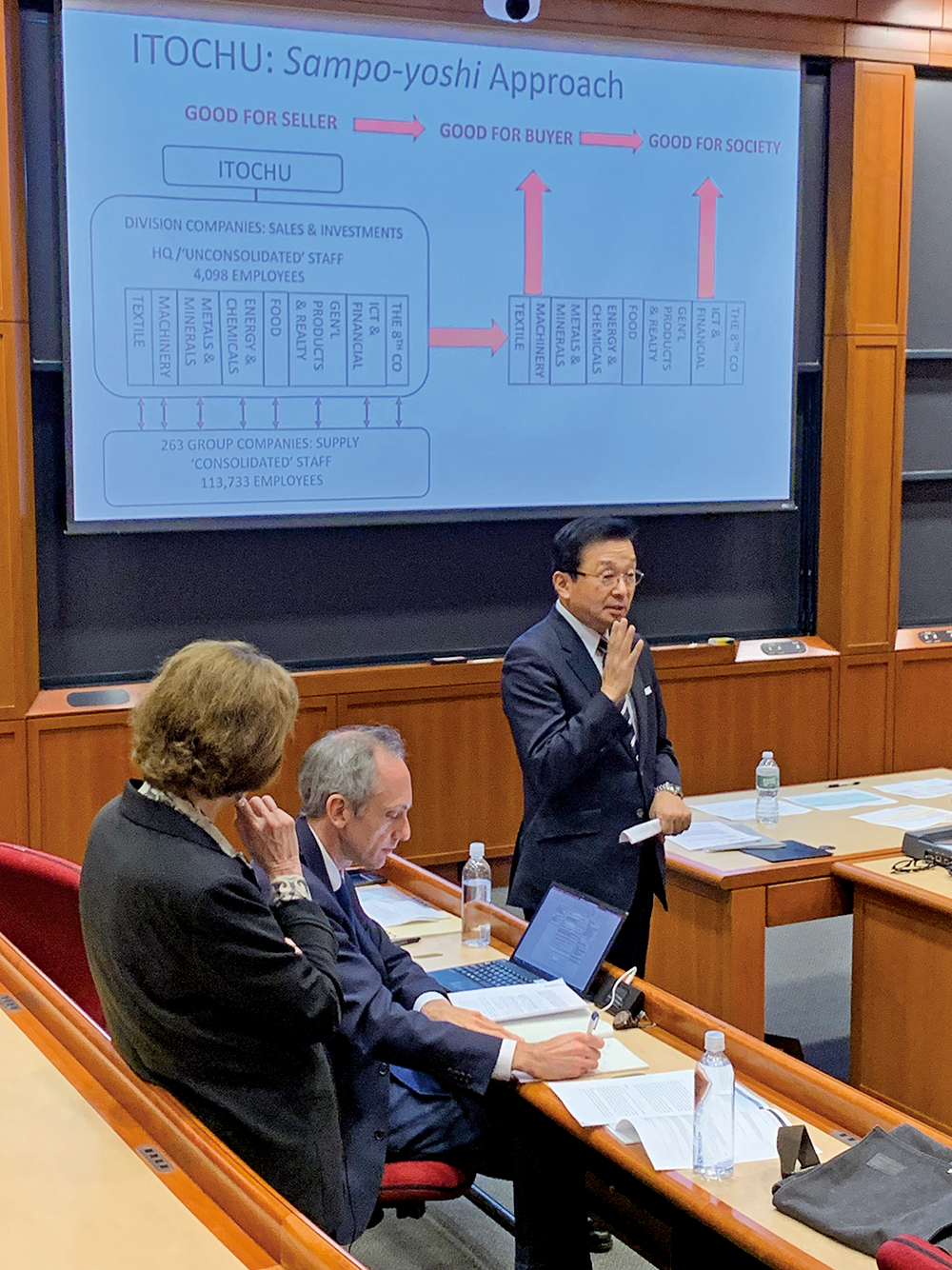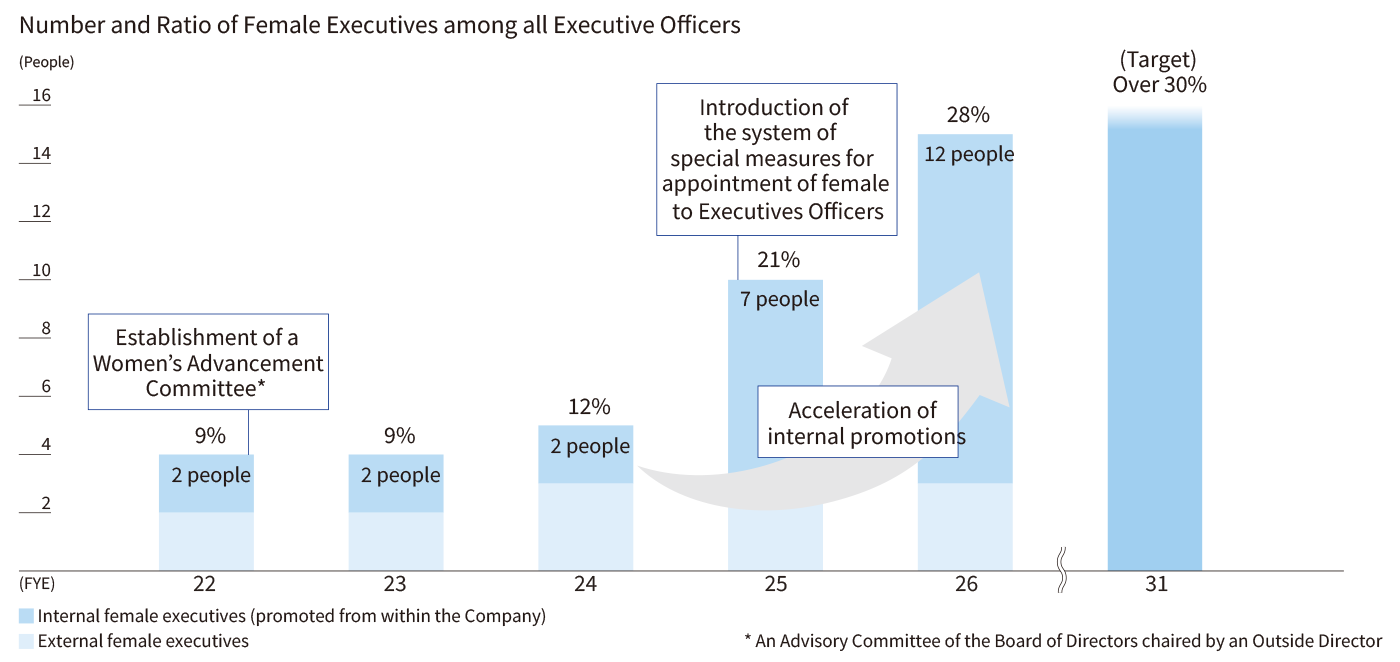CAO Interview

Our goal is to be a sustainable company, and the best company in Japan. Our approach is to embody our Company’s founding spirit of “Sampo-yoshi,” which is now attracting global attention, by accumulating trust and credibility to enhance our corporate brand value.
Member of the Board, Executive Vice President, CAO*
Fumihiko Kobayashi
* Chief Administrative OfficerOne year has passed since the announcement of the Management Policy “The Brand-new Deal.” How do you reflect on this past year?

https://sponsored.bloomberg.com/article/itochu/the-japanese-secret-to-business-longevity
In our Integrated Report 2024, I described our goal for ITOCHU to be seen as the best company in Japan by enhancing our corporate brand value through the philosophy of “Sampo-yoshi” (good for the seller, good for the buyer, and good for society). Over the past year, we have achieved a major milestone toward this goal. Professor Sandra Sucher, an expert in the research of building trusted corporations at Harvard Business School, took note of our corporate mission, “Sampo-yoshi,” and its role in achieving trust and sustainability at ITOCHU, selecting it as the subject for a case study. It has now been published as an official Harvard Business School case. This case from one of the world’s top business schools provides an academic analysis of the relationship between our initiatives grounded in “Sampo-yoshi” and enhanced corporate value and sustainability. Globally, there are many companies with long histories, but around half of the world’s companies that are over 100 years old are Japanese. Despite Japan’s frequent natural disasters—earthquakes, typhoons, floods—and periods of national devastation, many Japanese companies have managed to sustain their businesses over generations. In an increasingly uncertain economic environment, there is renewed global interest in the longevity and resilience of Japanese companies. I am delighted that our founding spirit of “Sampo-yoshi” is gaining international attention in this context. One of the pillars of our Management Policy, enhancing corporate brand value, is not limited to raising our profile in Japan but also aims to strengthen our global presence.

https://sponsored.bloomberg.com/article/itochu/the-japanese-secret-to-business-longevity

Professor Sucher’s focus on our corporate mission of “Sampo-yoshi” stemmed from her research into the post-COVID-19 recovery of Japanese companies. During the preparation of the case study, she visited ITOCHU, engaged in dialogue with Chairman & CEO Okafuji, and received firsthand explanations from employees of each Division Company about our business initiatives, which provided a clear picture of how “Sampo-yoshi” has shaped our corporate value for more than 160 years. I also had the opportunity to join a session of the Harvard Business School course Building Trusted Organizations to share some insights on the complexities of managing a general trading company and our consistent, trust-building process rooted in “Sampo-yoshi.” Although there are various theories about the origins of the “Sampo-yoshi” phrase, the first documented instance of it being introduced in the context of “good for the seller, good for the buyer, and good for society” was as a description of the business philosophy of our founder, Chubei Itoh I. While “Sampo-yoshi” is now our corporate mission, it was only relatively recently formally adopted in April 2020. When we officially established “Sampo-yoshi” as our corporate mission, we did not hold any employee briefings or distribute explanatory materials. Rather, we simply formalized a way of thinking that had already been deeply rooted and passed down among our employees. I believe it was accepted naturally throughout our Company. In essence, “Sampo-yoshi” functions as the “core operating system (OS)” of ITOCHU, installed at our founding. Initiatives such as our Morning-Focused Working System and other unique workstyle reforms are best understood as “business applications” tailored to the needs of each era and situation, fully leveraging the compatibility and effectiveness of our core OS. The growing global spotlight on “Sampo-yoshi,” as seen in the Harvard Business School case, reinforces my belief that this philosophy is deeply aligned with modern concepts of sustainability. It is true that following the inauguration of President Trump in the United States, there has been some pushback against the emphasis on sustainability and ESG. In fact, there have been reports that outflows from ESG investments have exceeded inflows, and the number of ESG funds is also declining. Regardless of the times, securing short-term profits is of course important for any company. However, companies that focus only on the short-term and disregard mid- to long-term profits, or in other words corporate sustainability, will not survive in the end. It may be a matter of differing views on the appropriate timeframe to consider. As a company with “Sampo-yoshi” as its core OS, we will not be simply swayed by changing trends. We will continue to steadily advance our front-line initiatives as outlined in our Sustainability Action Plans, ensuring that sustainability is realized through our core business.(→ Initiatives to Promote Sustainability)

ITOCHU introduced special measures for the appointment of female Executive Officers starting in FYE 2025. What are the background and impact of this initiative?
We have set a quantitative target to increase the ratio of female officers (including Executive Officers) to 30% or more by 2030. To achieve this goal, we have introduced special measures to appoint a certain number of female Executive Officers, providing them with special opportunities to gain experience in Companywide management. In FYE 2025, five women were appointed, and another five were appointed in FYE 2026, raising the current ratio of female Executive Officers to 28%. In addition, some of the appointees are junior managers, underscoring the uniqueness of this system both in overall balance at the Company and relative to our industry peers. Since the introduction of this system, we have received a wide range of feedback both internally and externally, including some critical opinions. This system would not have been possible if we had continued to rely solely on the implicit criteria for executive selection that existed in our Company in the past—such as having already achieved certain results as the head of a large organization or having adapted to all types of work environments. However, considering our workforce demographics, many of our female career-track employees are still in their 20s and 30s. If we simply wait for them to gain experience and naturally move up to Executive Officer positions, it could take more than 10 years. Faced with this reality, we felt a strong sense of urgency that we cannot afford to wait that long, and immediate action was required. As a company with a strong consumer-related business and a competitive edge in the consumer sector, the perspective of female leaders is extremely valuable.
As a means of addressing this issue, we placed a strong emphasis on internal promotions. If our sole objective was to increase the ratio of female officers, external hires would be a simple solution. While the mobility of talent in society is increasing and external hiring is becoming easier, our Women’s Advancement Committee, including Outside Directors, has repeatedly debated the pros and cons of external appointments. Yet, within our Company, there are many highly capable female career-track employees in their 20s and 30s who perform at the same level as their male counterparts. Given time, they have the potential to become Executive Officers, regardless of gender. Premature external hiring could demotivate these employees and undermine our ability to continuously develop internal talent. We must avoid this. These special measures are thus meant to bridge the “time lag.” The women selected as Executive Officers are individually supported by myself and members of the Women’s Advancement Committee, including Outside Directors; however, we do not provide any special management training. By being appointed as Executive Officers, these talented employees naturally gain access to Companywide management information, which expands their perspectives and deepens their insight. If they become aware of knowledge gaps, they can proactively consider what is needed and seek out the training or study required, with the Company providing support as necessary. Through this process, more opportunities are created for female employees, and the presence of women in core management roles helps to instill more diverse perspectives into our corporate culture. I believe this will foster an environment where women can naturally thrive and have a positive impact on the next generation as well. And eventually, the special measures will no longer be necessary.(→ Women’s Advancement Committee)![]()

What challenges do you perceive in aiming to become the best company in Japan?
In our Management Policy, “The Brand-new Deal,” announced in April 2024, we committed to enhancing corporate brand value. For our Company, which does not come from the same historical backing as general trading companies associated with the former zaibatsu (family-owned financial conglomerates), building and strengthening the ITOCHU brand in society is critically important. We are fortunate to have received increasingly high evaluations from various external stakeholders, and as I mentioned, our founding spirit of “Sampo-yoshi” is steadily gaining global recognition. However, no matter how excellent the core OS is or how many diverse business applications we have, it is ultimately up to each individual employee to bring them to life. Therefore, it is critically important that all employees share the same management philosophy and move forward together in the same direction. In recent years, employee engagement has been attracting increasing attention. At our Company as well, we follow up on the results, promptly identify issues, and undertake the necessary response. One thing I am always mindful of is the distance between top management and the front lines. Even amid an uncertain business environment, we have continued to achieve record-high profits, and as we aim for a new milestone of ¥1 trillion in consolidated net profit, our Company is now at a critical stage of management. In addition, the speed of our business development is accelerating, and it is essential for the entire Company to act promptly as one team. It is precisely in times like these that the ability of top management to communicate with front-line employees becomes especially important. Recently, Chairman & CEO Okafuji and our labor union met for the first time in about 10 years at our labor–management meeting, enabling top management to directly hear the voices of employees and in turn enabling top management to communicate its vision to the front lines. As organizations grow, messages can become distorted in transmission, and at those times direct and candid dialogue is necessary. We have fewer employees than other general trading companies, making our organization lean. If employees act with a strong sense of unity and operate even more efficiently and flexibly, it will be a tremendous advantage for us. I will continue to pay close attention to the sentiments of our frontline employees and further enhance communication with top management.(→ Human Resource Strategy)
We have a history spanning more than 160 years, and we intend to continue being a company trusted by all stakeholders under the “Sampo-yoshi” philosophy. I hope that “Sampo-yoshi” will become a globally recognized term, much like TOYOTA’s “Kaizen” (continuous improvement). Of course, we are not attempting to proclaim that “Sampo-yoshi” is uniquely limited to ITOCHU; rather, we hope that “Sampo-yoshi” will naturally spread throughout the world, and that people will come to realize that it actually originated from ITOCHU’s founding spirit, raising awareness of ITOCHU as well. According to Shiga University Professor Emeritus Hideki Usami, a scholar who has researched the Ohmi merchants for many years, when looking at the historical lists ranking the merchants of Ohmi, the highest accolades were apparently not necessarily given to merchant families that generated the greatest profits, but rather to those with a long history of business continuity across multiple generations. Merchants who were unable to sustain their businesses over time were not highly regarded. Regardless of changes in trading methods, merchandise handled, or the shape of society, the merchant families whose family mottoes and store rule (tanaho) passed down a spirit of “Sampo-yoshi,” thrift and frugal, and a spirit of building trust across generations were able to develop sustainably in their communities, steadily building on their forebearers’ credibility. As ITOCHU, which is close to the consumer sector, social trust is directly linked to our business success. Ultimately, the true value of a merchant lies in sustainability based on trust and credibility. My mission as CAO is to perform careful maintenance on our core OS, “Sampo-yoshi,” to continuously upgrade our individual business applications to reflect the changing times, and to sustainably increase a sense of unity among employees while aligning with our core OS. By steadily building trust and credibility with society, including our employees, we will continue to embody the spirit of “Sampo-yoshi” and seek to be the best company in Japan.

